The majority of these secret functions have been ingrained in iOS for some time, so people with older devices should be able to access at least some of them.
1. Customize your iOS Control Center
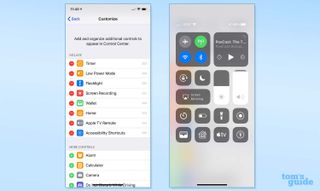
One iPhone hack that makes my life easier constantly is being able to customize Control Center. By adding your favorite and most used widgets to Control Center, you can access them with just a simple swipe down, even when your iPhone is locked. This is super handy when you need a feature right then and there. Personally, I find Music Recognition the most useful — no more fumbling around home screen folders, desperately trying to find the Shazam app before the song ends.
To customize your Control Center, go to Settings, then tap Control Center. Scroll down to More Controls and add any controls that’ll be handy at a moment’s notice.
2. Use Back Tap for extra iPhone controls
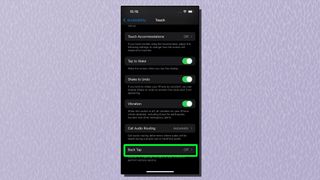
With Back Tap enabled, you can assign a range of different functions to both a double and a triple finger tap on the back of your phone, kind of like gestures on a trackpad. I use Double Tap for my Torch and Triple Tap for my Camera — these are both incredibly useful when I’m operating my phone at odd angles and can’t reach the lock screen icons or the Control Center pull down.
3. Unlock the interactive iOS weather map
While many modern iPhone models like the iPhone 14 Pro are waterproofed to the IP68 standard, it’s still no fun to get stuck out in the rain. Handily, the iOS Weather app has you covered with an easy-to-read interactive weather map so you can easily see the day ahead’s weather and never get caught short again.
With a scrolling 12-hour forecast for anywhere on the planet, featuring temperate, precipitation and air quality overlays, and all of your locations pinned, the app’s weather map virtually turns you into a weather reporter, and is difficult to stop using once you’ve started. To enable the interactive forecast, open the Weather app and tap the map icon in the bottom-left corner of the screen.
4. Share whatever is on your screen using Siri
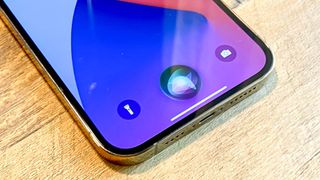
iOS comes with advanced sharing abilities using Siri. Instead of sharing the old fashioned way by pressing the share button, you can use Siri to share whatever is on your screen with a contact. It’s not a life-changing feature, but comes in handy when you need to share something quickly and/or don’t have your hands free to do so. An image or photo can be shared, as can a song you’re listening to on Spotify. If Siri can’t share your screen, for example with the Weather app, it’ll take a screenshot and send that instead.
To share your screen with a contact, simply say “Hey Siri, share this with…” whomever you’d like to see it.
5. Access the iPhone’s hidden trackpad
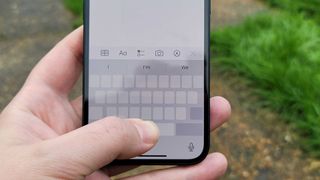
Even people with the smallest hands can find the compact keyboards of phone screens a little hassle-prone, and scanning through large chunks of text to find the exact spot you want to change used to be a fiddly task. To help with this, your iPhone features a hidden trackpad, which can be used to scan easily and precisely across your screen.
Just press and hold the space bar on your iPhone’s space key to turn the keyboard into a trackpad.
6. Turn your iPhone’s camera into a document scanner
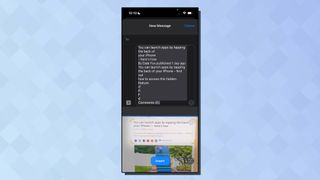
It used to be that scanning a document to turn physical pages into a digital file required a dedicated scanner or all-in-one printer. And indeed, for perfect carbon copies, this is still the case. But what if you just need to quickly turn that line from your textbook into a quote in your notes app? Unsurprisingly, iOS has a neat solution, and your iPhone’s camera is also a handy tool to convert physical text into digital.
To get started, open an app you want to scan text into — this could be Notes, Messages, or any other app that lets you enter text. In the text-entry area, tap and hold for a couple of seconds then release your finger. You should now see a scanner icon and “Scan Text” appear.
7. Drag and drop files and photos between apps
A little-known feature that can save you a ton of time is the ability to drag and drop between iPhone apps. With the drag and drop feature, you can quickly and easily import an image or video from your photos or a webpage, or even a PDF from your files, and drop it into an app like Notes or Messages. This hidden feature can be a little tricky the first time around.
Here’s the gist. You tap and hold on the file you want to move, then move it toward the top or bottom of the display. Then while continuing to hold that file with one finger you swipe up from the the bottom of the screen with another finger and open the app you want to drag your file into.
8. Enter hidden codes to unlock features
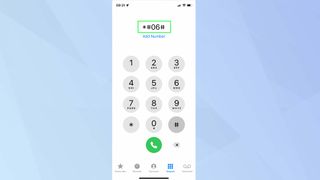
If you’ve ever typed in a code to find your IMEI or phone number when selling your phone, you may have an inkling of what this one’s about. What you might not know, though, is that as well as codes to find those numbers, there are also codes to tell your iPhone to do a whole range of things, from hiding your number, to diverting calls and even launching a field test mode to see data about your cellular connection. Simply open your Phone app, then head to the Keypad and dial in one of the codes.
9. Unleash the power of your iPhone’s calculator app
Like me, you might’ve thought the native Calculator app was a little basic at first, especially when compared to those giant calculators you used in math class at school. Well, maybe you should give it another chance: the humble Calculator app actually has a few tricks up its sleeve. Turn the iPhone landscape to unveil a scientific calculator, and swipe left or right at the top of the display to delete digits.
10. Search anytime, anywhere using Spotlight
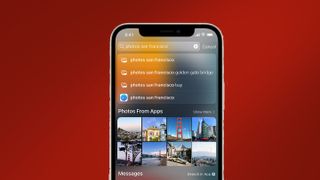
Spotlight search is a tool I’ve used on every Apple product I’ve ever owned, ever since I bought my first iMac after saving up money as a teenager. Sure, it’s not the most important feature on my iPhone, and certainly not the reason I buy Apple products, but it does save a lot of time when you need to get to something fast. To take that one step further, with iOS 15 you can now access Spotlight directly from your lock screen, meaning you can search immediately without needing to wait for Face ID to stop having a crisis.
To access Spotlight while locked, simply swipe down from anywhere but the top right of your screen (as this will open Control Center).
11. Enable Face ID when you’re wearing a mask
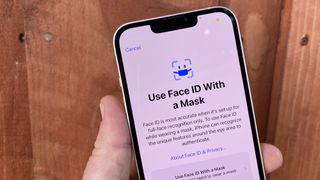
You can still use Face ID when you’re wearing a mask or other facial obstruction like a scarf. Once you turn on the switch to use Face ID with a mask on for the first time, you’ll have to rescan your face. The good news is that it seems you can turn the feature on and off without having to rescan your face each time. The bad news is that this makes your iPhone inherently a little less secure, as it is using less biometric data to unlock your phone. To enable Face ID with a mask, open the Settings app and tap Face ID & Passcode. Enter your passcode and toggle on Face ID with a Mask.
12. Use your flash for notifications
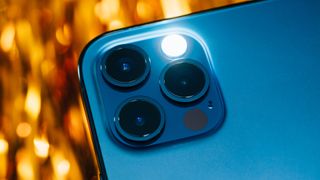
Ever get jealous of Android users with their neat LED notification lights? What you may not know is that the iPhone has a little-known accessibility feature which gives users a notification light, too. The iPhone’s LED flash can be set to flash for alerts, such as messages and other notifications. This is more of a visual accessibility tool than a customization feature, as you’ll only really notice it in the dark or if your phone is on a surface facing screen-down. But it’s still pretty handy, especially if you miss notifications a lot when on silent.
Open the Settings app, scroll down and tap Accessibility. Tap Audio/Visual, then scroll to the bottom and toggle on LED Flash for Alerts.
13. Cast Harry Potter spells using Siri
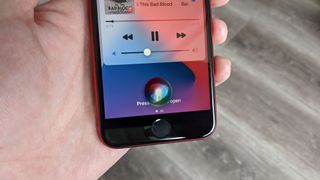
On top of being a powerful pocket-sized computer and camera, your iPhone also doubles up as a magic wand. That’s right. You can now use Siri to cast spells from Harry Potter and enable functions without having to lay a finger on your screen.
To cast a spell, say “Hey Siri,” followed by one of three spells. Say “Hey Siri, Lumos” to turn on your iPhone’s Torch. Say “Hey Siri, Nox” to turn the torch off again. Say “Hey Siri, Accio [app]” to open that app. More spells can be custom-made using Shortcuts.
14. How to use the zooming Maps slider
While we’re all familiar with the ubiquitous two-finger pinch zooming function across touchscreen devices, a simple yet relatively obscure feature of iOS is one-finger zooming on Apple Maps and Google Maps. This useful trick enables the use of both Apple Maps and Google Maps one-handed and one-fingered, which comes into its own when navigating a new place with full hands.
In map view, simply double tap on the screen and the map will zoom in slightly. To control the zoom level, double tap the screen but keep your digit held down on the second tap. You can now zoom in and out.
15. Hide sensitive or unwanted apps using the App Library
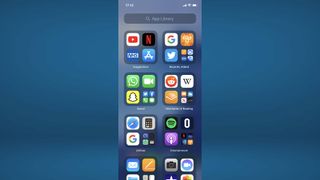
Instead of trying to find a place or folder for any Apps you don’t use — or you don’t want people to see — it’s easier to just move them out of sight completely with this little-known trick. You can now remove an app from your home screen without deleting it completely, using the App Library.
To get started press and hold the app you want to hide. After a couple of seconds, a menu should appear with multiple options. From this options menu, select “Remove App.” Doing this will bring up a second menu, press “Remove from Home Screen.”
16. Turn on background sounds to ease stress
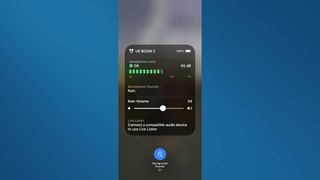
If you’re in need of a bit of relaxation, you can use the Background Noise feature to pump soothing ambient noise through your AirPods, including rainfall, streams, oceans, and white noise. I can personally vouch for how useful this feature is when working, and it regularly helps me cut out distractions and focus on my work. What’s more, unlike putting on an ASMR or ambient noise track on Spotify or Apple Music, this feature isn’t streaming anything, so it works even without an internet connection.
Just open Settings and then tap Accessibility. Next select Audio/Visual, then tap Backgrounds Sounds and toggle on Background Sounds at the top.
17. Rearrange multiple apps at once
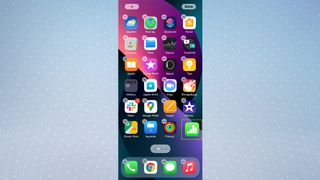
If you’ve ever done a full-scale rearrange of your iPhone’s Home Screen, you’ll know how tedious it can be to move each and every app one by one — so don’t. One of the handiest little-known features of the iPhone is that you can drag and move multiple apps all at once. This enables you to clean up your Home Screen in a fraction of the time.
To get started, Tap and hold an app on your Home Screen and move your digit slightly until all your app icons start wiggling. Keep your digit held down and use another digit to select other apps that you want to move — you’ll notice they’ll all be grouped together. Keep your original digit still held down and use another digit to navigate to a place or folder on the Home Screen. Then, release your digit and they’ll all be moved.
18. Get custom battery alerts with a shortcut
Ever miss those 15%, 10% and 5% battery alerts your iPhone gives you because your phone’s on silent? We’re the same. Thankfully, you can avoid this using a simple shortcut to set alerts at 30% or 40%, giving you more of a heads up that you’re starting to get low. Better still, you can have Siri announce your battery warning, so even if you keep your iPhone on silent, you’ll never miss the battery warnings again.
To get custom battery alerts, create a new automation in the Shortcuts app, tap battery level and specify a percentage to get notified at. Then tap Add Action to customize what your iPhone does once you hit that level.
19. Track flights using Messages
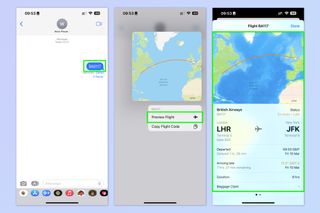
One of our favorite Messages features here on Tom’s Guide is the ability to track flights within a chat — that’s right, you can actually track live flights using Messages! If you’ve got a friend or family member flying in to see you, or you’re flying out to them, you can use Messages to track the flight and see important information such as the flight’s departure time, whether the flight is running late, the expected arrival time and even the arriving baggage carousel number. You’ll also see a map showing where the flight is! Super cool. To track a flight on in Messages, one party must send the flight number as a message. Then, long press the flight number and tap Preview Flight.


